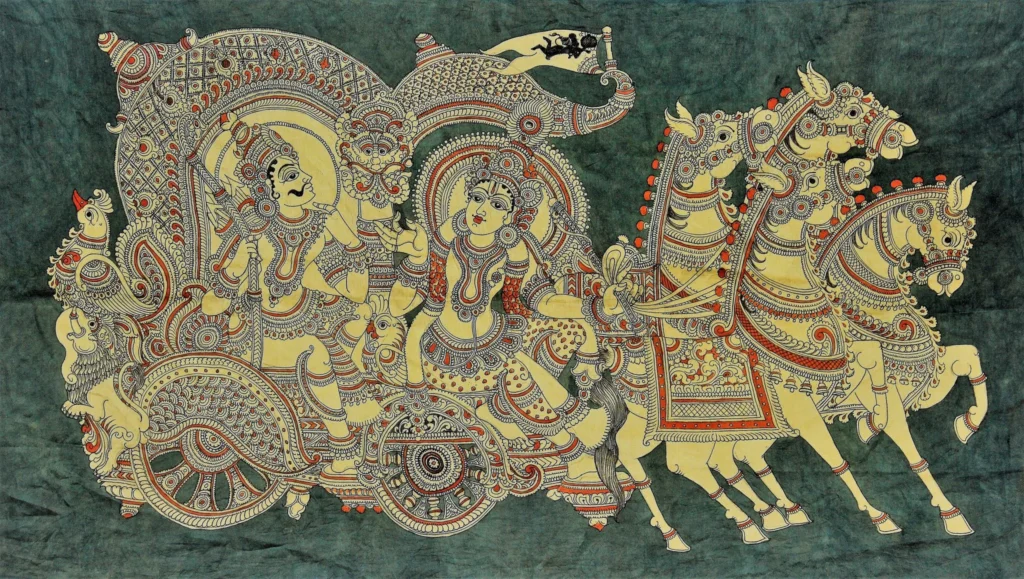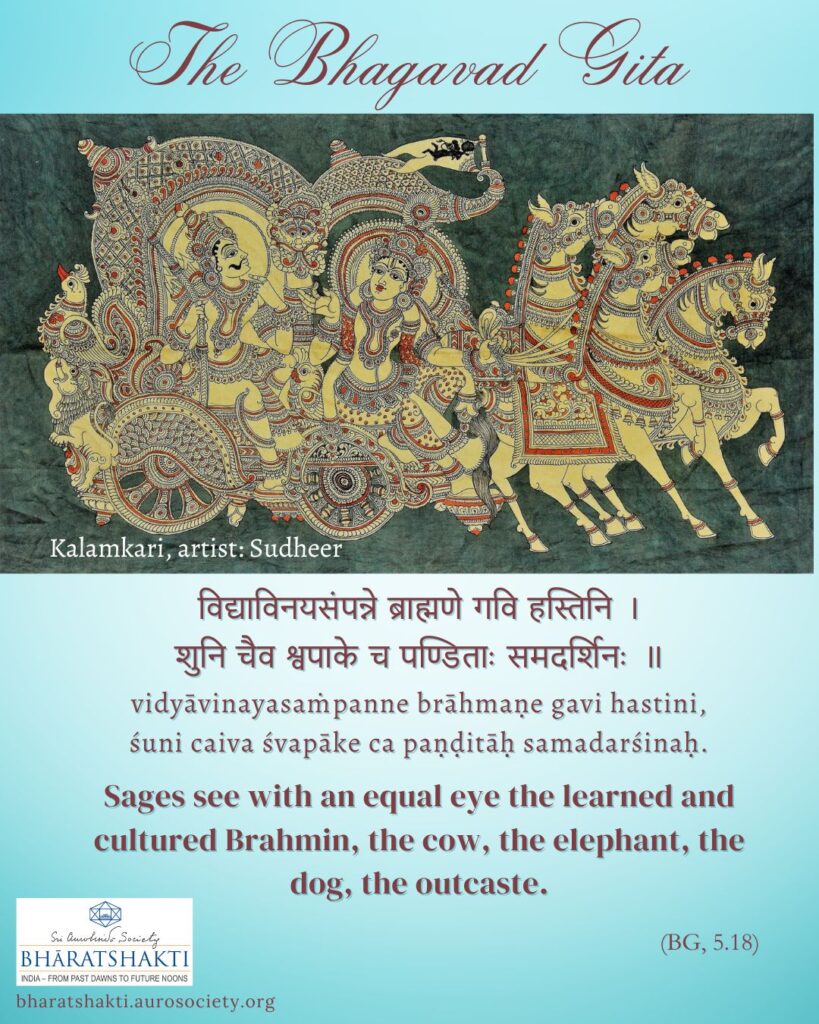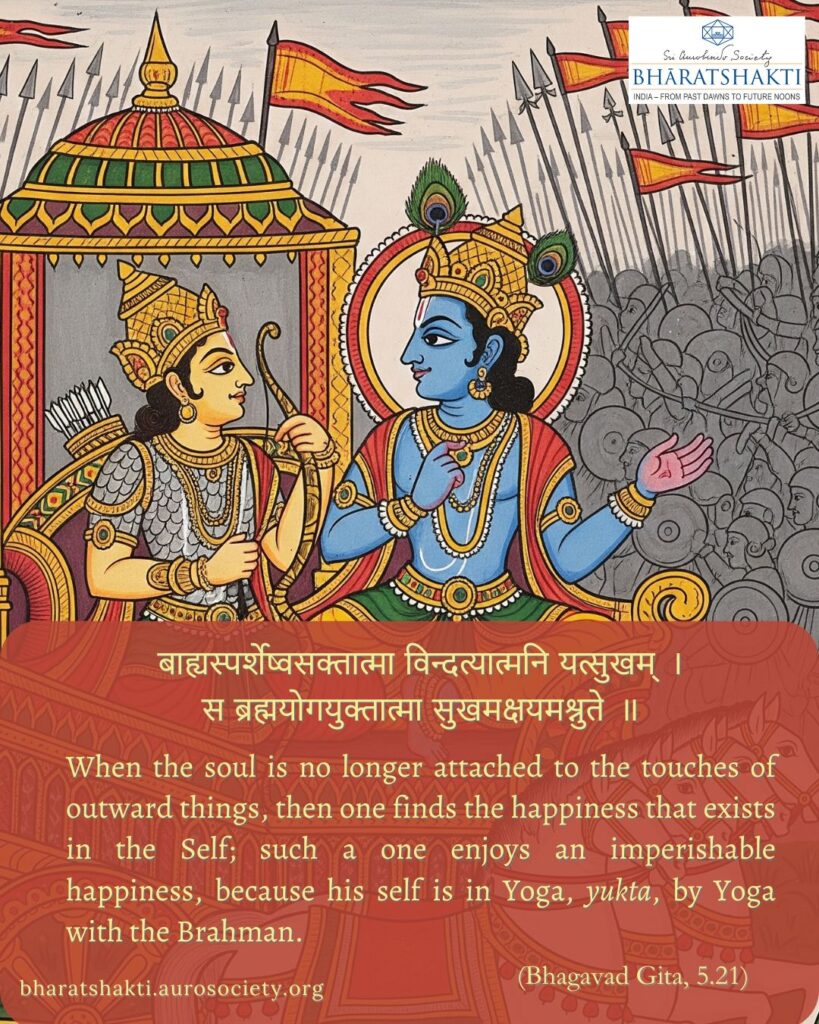Date: August 26, 2025
Part 12: The Yoga of the Renunciation of Action – 2
Continued from Part 11

We continue our brief study of the signs of a Divine Worker.
A divine worker is free from the desire of the fruits of action and is conscious of working only as an instrument of the Divine through the Shakti manifest in his or her nature. But this does not mean that the work may be done imperfectly or ineffectively without a right understanding of the capacities and means at one’s disposal. On the contrary, for a Karmayogin doing perfect work comes easily because he or she is poised in a deep tranquility instead of working blindly under the yoke of his limited hopes and fears, “lamed by the judgments of the stumbling reason, running about amidst the eager trepidations of the hasty human will” (CWSA, Vol. 19, p. 180).
READ IN RENAISSANCE
yogaḥ karmasu kauśalam
Sri Aurobindo on Yoga and Skill in Works
A Karmayogin does all the work in an impersonal manner, driven by the action of a great universal light and power operating through his or her individual nature. Such a worker knows that all the necessary capacity, power, understanding, will and energy will be given by the Divine, and directed towards an aim which is also determined by the Divine.
“The result may be success, as the ordinary mind understands it, or it may seem to that mind to be defeat and failure; but to him it is always the success intended, not by him, but by the all-wise manipulator of action and result, because he does not seek for victory, but only for the fulfilment of the divine will and wisdom which works out its ends through apparent failure as well as and often with greater force than through apparent triumph.”
One who is liberated from the bondage of avidya, has realised the knowledge of the Self, does not work for personal goals, nor does he or she seize on things as personal possessions. Receiving what the divine Will brings, a yogin covets nothing and is therefore jealous of none. Not moved by repulsion or attachment, grief or loss, a divine worker works with senses under perfect control and is completely free from reaction and passion. All action for such a yogin is indeed a purely physical action, śārīraṁ kevalaṁ karma; “for all else comes from above, is not generated on the human plane, is only a reflection of the will, knowledge, joy of the divine Purushottama” (ibid.)
A divine worker knows that the idea of virtue or vice, punya or paap is not at all about the outward deed, rather it takes birth “in an impure reaction of the personal will, mind and heart which accompanies it or causes it.” The impersonal, the spiritual is always pure, and gives to all that it does its own inalienable purity. This spiritual impersonality is a third sign of the divine worker.

Sri Aurobindo makes an important distinction here. Many great individuals over the course of human history have felt some impersonal Force or Will guiding them or working through them. But are they all Divine Workers in the sense in which the Bhagavad Gita speaks of Karmayoga? The difference lies in an important detail concerned with the inner realisation of the unity with the Divine, for without that Yogic poise, no true freedom from movements of the ego are possible. Those who have not attained such freedom are still bound by their egoistic reactions of their human personality. And as a result any touch or guidance they receive from an Impersonal Force or Will gets distorted by their egoistic reactions.
On the other hand, a yogin who has cast his or her personality into the impersonal and is no longer a sum of his or her natural qualities is “something unbound, large, flexible, universal.” Such a liberated soul’s outer appearance of personality is there only for the operations of Nature, “a free mould for the Infinite, it is a living mask of the Purushottama” (CWSA, Vol. 19, p. 181).
With this freedom from the bondage of nature’s movements within, complete desirelessness and having attained an impersonality, the Yogin arrives at a perfect equality in the soul and the nature. This equality or samatvam is the fourth sign of the divine worker.

In our ordinary state of ignorance, we look at the outward happenings of the world and determine some as good happenings and others as evil, because we are bound by our hopes and desires. A desireless divine soul does not get trapped in these ordinary distinctions, because he or she has passed beyond all the dualities, is dvandvātīta. To such an individual, all outward happenings are “equally welcome since by their mingled strand are worked out the developing forms of the eternal good”. For a divine worker, “every turn of the conflict has been designed and mapped by the foreseeing eye of the Master of the battle, the Lord of works and Guide of the dharma.” (ibid.)
A liberated soul having realised the Divine within attains an equal drishti towards all. Such a soul only sees two things in all and everything. One that the Divine inhabits equally in every being. And second, that the difference in manifestation of the Divine is unequal only because of a temporary circumstance. Sri Aurobindo speaks of this as another sign of a divine worker, because only through this equal eye, a divine worker attains perfect innate inner joy and peace independent of any outer circumstance. He writes,
In the animal and man, in the dog, the unclean outcaste and the learned and virtuous Brahmin, in the saint and the sinner, in the indifferent and the friendly and the hostile, in those who love him and benefit and those who hate him and afflict, he sees himself, he sees God and has at heart for all the same equal kindliness, the same divine affection. Circumstances may determine the outward clasp or the outward conflict, but can never affect his equal eye, his open heart, his inner embrace of all. And in all his actions there will be the same principle of soul, a perfect equality, and the same principle of work, the will of the Divine in him active for the need of the race in its gradually developing advance towards the Godhead.

This perfect inner joy and peace which depend on no external cause is central to the divine consciousness itself. It is innate because it is very stuff of the soul’s consicousness, the very nature of the divine being, says Sri Aurobindo. In our ordinary ignorant state, we depend on outward things for our happiness. This leads to desires and expectations, resulting in ups and downs, full of moments of anger and passion, pleasure and pain, joy and grief.
But a liberated divine soul is not touched by any of these outer circumstances; rather the source of all the divine ease, glad light and true delight that such a being is poised in is eternally present within. This does not mean that he or she is indifferent to outward things, but rather experiences the joy of every thing as an expression of the Divine.
It does not rejoice in the touches of the pleasant or feel anguish in the touches of the unpleasant; neither the wounds of things, nor the wounds of friends, nor the wounds of enemies can disturb the firmness of its outgazing mind or bewilder its receiving heart; this soul is in its nature, as the Upanishad puts it, avraṇam, without wound or scar. In all things it has the same imperishable Ananda, sukham akṣayam aśnute.
To be continued…

